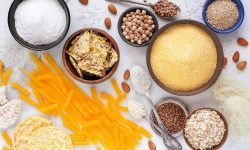Favourite Gluten-Free Items Available at Spud May National Celiac Awareness Month, but every day Spud…
There are a lot of misconceptions about organic food out there, from what it actually is, how it impacts your health and the environment, and why you should or shouldn’t buy it. We’ve collected some of the basic information here for you.
What is certified organic?
Organic produce and other ingredients are grown without the use of pesticides, synthetic fertilizers, sewage sludge, genetically modified organisms, or ionizing radiations.
Instead, organic farmers use high-quality compost, cover crops, and crop rotations to keep soil healthy, and to allow it to rest and regenerate. Plants grown in healthy soil are better able to feed and protect themselves from pests and disease, which means they won’t require heavy applications of fertilizers and pesticides. Organic farmers grow crops that are appropriate to their climate and soil conditions in order to optimize natural growth cycles, and promote biodiversity by growing a variety of crops rather than one single crop.
Animals used for meat, dairy, or eggs are not given antibiotics or growth hormones. They are not fed the by-products of other animals. They eat a certified organic diet. These animals are not kept constantly caged indoors without access to fresh air, or without the ability to socialize with other animals. Their healthier lifestyle means they do not need antibiotics to avoid sickness.
Organic processed foods cannot contain any chemical preservatives or synthetic additives like colours or waxes.
Environmental Impacts
Soil: Organic farming practices such as crop rotation, growing different crops together, cover crops, minimum tillage, and organic fertilizers work to improve the soil formation and structure, thereby helping to create more stable systems. This helps to prevent soil erosion and increases the ability of soil to absorb nutrients and water, lessening the need for agricultural inputs.
Water: Pollution of groundwater with synthetic fertilizers and pesticides is a major problem. As the use of these is prohibited in organic agriculture, the risk of contamination is greatly reduced.
Air & Climate Change: The synthetic pesticides and fertilizers used in conventional farming are often made from fossil fuels. Producing and transporting these agrochemicals requires a lot of energy, and is a significant source of greenhouse gas production. Organic farming practices help reduce non-renewable energy use by decreasing agrochemical use. Organic agriculture also contributes to mitigating the greenhouse effect and global warming through its ability to sequester carbon in the soil, as opposed to releasing it into the atmosphere.
GMOs: Genetically modified organisms are not allowed in any part of growing, processing or handling of organic food. As the potential impact of GMOs to both the environment and health is not entirely understood, organic agriculture is taking the precautionary approach and choosing to encourage natural biodiversity. GMO plants and animals can greatly reduce biodiversity by overrunning existing species.
Biodiversity: By using non-GMO seeds, organic farmers are supporting biodiversity from a gene level. Seeds are adapted and bred for greater resistance to disease and climatic stress. Organic farming also increases biodiversity at every level of the food chain – from bacteria to mammals. By not using inorganic pesticides and fertilizers, adopting wildlife-friendly management of habitats where there are no crops, and including strategies such as not weeding close to hedges, and by mixing arable and livestock farming, organic farms are aiding biodiversity of plants and wildlife, as well as biodiversity of ecosystems.
This is important because a healthy biodiversity contributes to protection of water and soil resources, pollution breakdown and absorption, and climate stability. It also provides biological resources such as food, medicine, and wood.

Health Impacts
While there is no definitive research that proves organically produced food is more nutritious than conventionally produced food, some studies have shown organic produce to be higher in some nutrients than their conventionally grown counterparts.
More research has been done on the effects of pesticides used in conventional agriculture on human health. Toxic effects ranging from acute poisoning to subtle, subclinical effects are caused by long-term, low dose exposure to agricultural pesticides are common among farm workers and those living near farms.
Of course, for most people, the primary form of pesticide exposure is through their diets. Studies have shown that those who consume conventional produce have higher levels of pesticide residues in their bodies than those who ate organic only organic produce, regardless of whether or not that produce was washed.
Common sense may indicate that chronic pesticide exposure, and measurable levels of pesticides in one’s body, are undesirable and potentially dangerous. However, there is not yet any evidence of a causal relationship between pesticide exposure from consumption of conventional foods and adverse neurodevelopmental health outcomes. More research in this area is needed.
Why is Organic Food More Expensive?
Organic food is more expensive than conventionally produced food for several reasons. The main reason is that supply is limited compared to demand for organic food. In addition, production cost for organic produce is typically higher. Post-harvest handling of relatively small quantities of organic food also results in higher costs, due to the mandatory segregation of organic and conventional produce. However, when we pay the higher price for organic food, we are paying not only for the cost of the food, we are also paying for environmental enhancement and protection, higher standards for animal welfare, avoidance of health risks for farmers due to pesticide exposure (mitigating future medical expenses), and rural development by creating increased farm employment and assuring a fair income to farmers.
Another way to look at the question is to ask “why is conventional food so cheap?”. We tend to assume the price of conventional food is the price we should be paying, but that price externalizes a lot of costs, like pollution and higher energy inputs, meaning it is actually artificially low. In fact, the external costs of production for conventional agricultural products are 3 times those for organically produced commodities.
Sources/More Reading:
https://www.newscientist.com/article/dn6496-organic-farming-boosts-biodiversity/
https://www.government.nl/topics/biotechnology/contents/consequences-of-gmos-for-biodiversity
http://eartheasy.com/article_high_cost_organic_food.htm
http://www.express.co.uk/news/uk/2761/Kiwi-fruits-are-better-if-organic
http://pediatrics.aappublications.org/content/130/5/e1406





